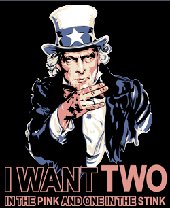
|
The Justification of the Stamp Act of 1765
by Anonymous Rebel
After the Seven Years' War, the British had accumulated an extremely large debt. The maintenance of a military force in America had become quite costly. The British government felt that it was only logical to tax the Americans in order to compensate for the expenses. As a means of bringing the colonies "to a sense of their duty to the King, to awaken them to take care of
their lives and their fortunes," colonial governors had proposed a stamp tax. The colonists felt that the tax was extremely unfair, since they were not represented in Parliament, and they were being taxed without consent. However, their cries were really just cries of selfishness. The British were completely justified in proposing a stamp tax, and should have supported it without yield.
Prime minister George Grenville officially proposed the stamp tax before Parliament and offered the colonies one year to come up with a better tax. He backed the Stamp Tax with this speech:
I have proposed the resolution from a real
regard and tenderness for the subjects in the
colonies. It is highly reasonable they should
contribute something towards the charge of pro�
tecting themselves, and in aid of the great
expense Great Britain has put herself to on their
account. No tax appears to me so easy and
equitable as a stamp duty. It will fall only
upon property, will be collected by the fewest
officers, and will be equally spread over America
and the West Indies . . . It does not require any
number of officers vested with extraordinary
powers of entering houses, or extend a sort of
influence that I never wished to increase. The
colonists now have it in their power, by agreeing
to this tax, to establish a precedent for their
being consulted before any tax is imposed upon
them by parliament; for their approbation of it
being signified to Parliament next year . . .
will afford a forcible argument for the like
proceeding in all such cases. If they think of
any other mode of taxation more convenient to
them and make any proposition of equal efficacy
with the stamp duty, I will give it all due
consideration.
The colonists, however, failed to find a more suitable form of taxation. The bill was passed easily through both the House of Commons and The House of Lords. Englishmen felt that this was the best tax policy ever passed through Parliament, since the expense was so minimal. The tax also did not request Americans to carry the burden of the National debt. The act only asked the colonists to pay a portion of the 350,000 pounds necessary to maintain a British Army in North America. The Stamp Act was expected to raise 60,000 pounds annually. This insignificant amount equaled only a shilling per colonist, per year: the equivalent of a third of a day's labor. Since the sum was so meager, no opposition was expected. "They must be the veriest beggars in the world," stated one Englishman, "if such inconsiderable duties appear to be intolerable burdens in their eyes."
According to the Stamp Act, "about fifty trade items and
certain types of commercial and legal documents, including
playing cards, pamphlets, newspapers, diplomas, bills of lading,
and marriage licenses were required to be stamped by officers
appointed by the government." The Act was to go into action
November 1, 1765. The colonists cried that the Stamp Act was
taxation without representation; Grenville, however, simply
stated that the members of Parliament represented every English
man in the empire, including Americans.
Grenville's main fault in proposing the Stamp Act was that
he didn't take into consideration the effect it would have on the
upper class of Americans. The wealthy had previously supported
the British, and had been Britain's stronghold. however, the
Stamp Act would hurt the upper class the most, especially the
merchants and lawyers. They would spend the most money on taxes,
since all their legal documents would be stamped and they had the
most money to spend on excessive items such as dice and playing
cards. Also, this act did not use the usual strategy of "divide
and conquer" like previous laws had done. The Stamp Act had
united the colonists: it gave them all one common enemy. Over
time, the Stamp Act would benefit the Americans more than hurt
them.
The Stamp Act did not exactly work as planned in America.
The American stamp masters were being chased and burned in effigy
by the Sons of Liberty. Grenville had felt that by employing
Americans to collect the taxes, the colonists would accept the
policy more. However, the colonists to the Negro overseers, who
treated the slaves even more harshly than the white overseers
did. "A foreigner we could more cheerfully endure," shouted a
Son of Liberty, " because he might be supposed not to feel our
distresses; but for one our Fellow Slaves, who equally shares in
our Pains, to rise up and beg the favor inflicting them - is that
not intolerable?" The stamp masters became the most hated men in
the colonies. Since Grenville couldn't be touched, they received
all the anger. Their houses were wrecked and their property was
stolen. Most of the stamp masters were never given the chance to
sell one stamp: they were too terrified by the huge mobs. In
stead, the stamps were hidden or sent back to the sea.
A chest with the Stamp Act was buried in Portsmouth on November 1, with an inscription on the coffin lid, reading "Liberty aetes 145, Stamp'd." Flags were at half-mast in New York, signifying the death of Liberty. The colonial merchants began a boycott of English goods. Seven eighths of trade with New England had halted, and England was suffering greatly. Unemployment rates went up in Birmingham, Scheffield and Norwich.
The British needed to make a decision whether they should
enforce the Stamp Act. King George III desired an amendment of
the act; one that would satisfy the colonists.
However, his new minister, Rockingham, explained to him that the
only options were enforcement or repeal. Reluctantly, the King
chose repeal. Years later, he realized that repeal was a mistake. "The fatal compliance in 1766," he wrote, "encouraged the
Americans annually to increase in their retentions to the point
of that thorough independency which one state has of another."
In May, 1977, he wrote "the too great lenity of this country
increased their pride and encouraged them to rebel."
King George III was correct by proposing an amendment of the
Act. Great Britain could have made the Stamp tax purely nominal,
rather than giving in to the colonists. By repealing the Stamp
Act, Great Britain had acknowledged the colonists' cries of
taxation without consent. The repeal also gave Americans an
extreme boost of confidence. If the Americans could have Stamp
Act repealed by riots and demonstrations, then they could have
any "unfair" act repealed in the same manner.
After repealing the Act, the British government had to be extremely careful in their policies with America. The Americans were no longer willing to be treated like a colony, but rather a nation. Britain, on the other hand, wanted to keep their policy of imperialism. Inevitably, one side had to yield, or war would ensue. The British should have spent the next few years preparing for the inevitable battle.
Actually, Great Britain should have taken up arms in 1766 instead of 1775. The Stamp Act was the first challenge to British authority, not the Boston Tea Party. In 1766, the colonies were not prepared for war, and major differences kept the colonies from uniting. By 1775, the colonies had temporarily set aside their differences in order to face the common enemy. Also, in 1766, the Americans could not have received France as an ally like they did in 1778. The reason for delaying the war was because the British did not want to use force to solve their problems. The British didn't want to go to war over the Stamp Act. On the other hand, the Americans would rather fight then face the Stamp Act. By shunning violence, the British missed their chance for victory.
If one looked back upon 1765, he would realize that Parliament was justified in proposing the Stamp Act. The colonists had little to complain about: they weren't paying any tariffs to Britain, and were being militarily protected from foreign invasion. The British had to pay an enormous sum of taxes, including a stamp tax. It is hard to believe that the colonists could complain about having to pay one third of the costs necessary to maintain a military force in America. Benevolently, the British gave in to America's whining and repealed the act: a decision they will long regret. The main reason Americans of today feel that the Stamp Act was unjust is that our forefathers have implanted a sense of hatred toward what we call "British tyranny."
|

|

